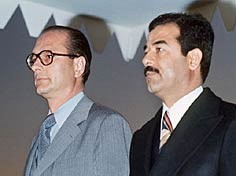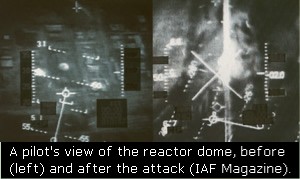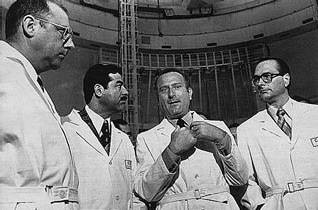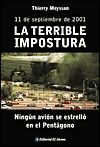
Jacques Iraq aka Jacques Chirac: |
"Behind Jewish suspicion of the French agenda today stands the legacy of anti-Semitism and the Second World War." -- Former Israeli Prime Minister Benjamin Netanyahu, December 1996.2"The first, Jacques Chirac, described the second, Saddam Hussein, as a personal friend, showed him around a French nuclear reactor and invited him to his home for the weekend. It was about this time that the prime minister was nicknamed Jacques Iraq."1
In 1967, General Charles de Gaulle undercut Israel in crisis and cultivated Arab countries.6
- Marshal Philippe P‚tain's collaborationist Vichy government, in alliance with the Nazis, deported between 61,000 and 80,0002 Jews to the extermination camps. Estimates vary.
- On December 23, 2001, Deputy Foreign Minister Rabbi Michael Melchior expressed his concern over the increasing anti-Semitism in France and in Belgium. He stated that in the past 15 months, there had been almost 200 anti-Semitic incidents in France.3 (Melchior is a recipient of the Nobel Institute's Prize for Tolerance and Bridge-Building.4)
By 1970, France was one of Iraq's main trading partners.6 Diplomatic and economic ties were given a crucial boost in 1974, when the then French Prime Minister, and current President, Jacques Chirac, called Saddam Hussein a personal friend.6
- At the end of May 1967, a week before the Six Day War broke out, De Gaulle ordered all French military aid to Israel stopped.2 De Gaulle denounced the Jews "as an elite people, sure of themselves and domineering."5
- He sought to boost trade ties with oil-rich Arab nations and extend French influence against the "Anglo-Saxons."6
In December 1974, then Vice President Saddam Hussein invited then French Prime Minister Jacques Chirac to Baghdad. Chirac accepted and visited Iraq in 1975. Chirac is the only Western leader to have a personal knowledge of the Iraqi president.7
- Saddam Hussein approved a deal granting French oil companies a number of privileges plus a 23 percent share of Iraqi oil.7
- Chirac agreed to sell two reactors to Iraq. The Iraqis purchased a 70-megawatt reactor, along with six charges of 26 points of uranium enriched to 93 percent -- in other words, enough weapons-grade uranium to produce three to four nuclear devices. Iraq also purchased a one-megawatt research reactor, and France agreed to train 600 Iraqi nuclear technicians and scientists -- the core of Iraq’s nuclear capability today.9 One of the reactors, at Al-Toweitheh, 40 km south of Baghdad, was named Al-Tammuz or Osirak (some say this is a contraction of Osiris and Iraq) in reflection of its French predecessor, (Tammuz and Osiris are the names in Babylonian and Egyptian, respectively, for the same god in ancient pantheons.) Al-Tammuz emerged as the core of Iraq's efforts to develop nuclear weapons.7
Jacques Chirac visiting Baghdad
At left: Saddam Hussein
- Israel destroyed Al-Tammuz in an air raid. Ilan Ramon, the Israeli astronaut who died in space shuttle Columbia on February 1, 2003, was the youngest among the pilots who destroyed the Tammuz reactor in Iraq in an air raid on June 7, 1981.
In 1976, Saddam Hussein made his first and only visit to a western capital.7 At Orly Airport, Chirac called Hussein his "personal friend." Hussein agreed to sell France huge quantities of oil.2

Tammuz 2 in ruins after American attack in 1991. (larger copy of photo above)

Saddam Hussein in France visiting a nuclear reactor
At far right: Jacques Chirac
Saddam Hussein in France visiting a nuclear reactor
Second from left: Jacques ChiracFrench arms sales and infrastructure projects in Iraq continued apace through the remainder of the 1970s. By the late 1970s, France was second only to the Soviet Union as a supplier of both civilian and military equipment to Iraq.6
- The dates of and sequence of transactions in these two reciprocal visits are reported inconsistently. The years 1974, 1975, and 1976 are given, and sometimes the purchase of nuclear reactors is said to have been made in the second visit (by Hussein to France) rather than in the first visit (by Chirac to Iraq).
In the 1980s, the French socialist government continued the trend.6
In a 1986 report about Chirac’s attempt to return to the premiership, the New York Times reported that the French official “has said many times that he is a personal friend of Saddam Hussein of Iraq.”9
- France strongly backed Iraq in its war against Iran. Other Western countries also did so. France and Russia provided the bulk of Iraq's war support.6
- France supplied Iraq with sophisticated weaponry, including Mirage F1 fighter-bombers, Super Etendard aircraft equipped with Exocet anti-ship missiles,6 and equipment to improve the accuracy and range of Scud missiles.2 The sales are estimated at $20 billion.7
- When Iraq had trouble paying, France rescheduled its debt.6
In 1987, the Manchester Guardian Weekly quoted Chirac as saying that he was “truly fascinated by Saddam Hussein since 1974.”9
Iranians referred to Chirac as “Shah-Iraq” and Israelis spoke of the Osirak reactor as “O-Chirac.”9
When Iraq invaded Kuwait in 1990, France took a lukewarm approach to the Kuwait's liberation.
Economically, French ties with Iraq have been a costly disaster.6
- President Francois Mitterand sent emissaries to 24 countries to assure their governments French participation was purely defensive.2
- Just a few days before Operation Desert Storm began in 1991, French envoys in Baghdad tried to find a diplomatic solution.6
- Only after the French Embassy in occupied Kuwait was raided and four French citizens kidnapped did Mitterand take a firmer line against Saddam Hussein.2
In 1992, author-journalists Claude Angeli and Stéphanie Mesnier interviewed Saddam Hussein. While speaking of his sense of betrayal by France for its participation in the Persian Gulf War, Hussein threatened to expose French politicians for their support of his regime unless they continued to support him. Angeli and Mesnier published the quotation in their book, Notre Allié Saddam (Our Ally Saddam) (O. Orban 1992) ASIN: 2855656583, 274 pages, which is now out of print. They reported Hussein as saying:8
- After helping Saddam Hussein build airports, factories and weapons, France is saddled with $4 billion in unpaid bills.6
- France helped arm a power that it later had to fight.6
- French diplomacy with Iraq has yielded scant results.6
In 1994, when American troops were rushed to the region after Iraq massed two divisions of Republican Guards near the Kuwaiti border, French Defense Minister Francois Leotard came to Iraq's defense. He said Iraq had not violated any U.N. resolutions, and he accused the United States of playing election-year politics.10As for financiers, industrialists and above all those responsible for military industry, the question must be put to French politicians: Who did not benefit from these business contracts and relationships with Iraq? . . . With respect to the politicians, one need only refer back to the declarations of all the political parties of France, Right and Left. All were happy to brag about their friendship with Iraq and to refer to common interests. From Mr. Chirac [now the center-right president] to Mr. Chevenement [the socialist former defense minister] . . . politicians and economic leaders were in open competition to spend time with us and flatter us. We have now grasped the reality of the situation [of France's support for the 1991 Gulf War, a betrayal in Saddam's eyes]. If the trickery continues, we will be forced to unmask them, all of them, before the French public.
When Chirac became president, he followed his avowed model, General de Gaulle, to promote Gaullist power against U.S. power and support for Arab nations against Israel.2
In 1995, France reopened its embassy in Baghdad at the charg‚ d'affaires level.10
- In 1996 Chirac delivered a speech at Cairo University where he forwarded France as an alternative to the U.S. as Middle East peace broker.
- Chirac said Arabs would benefit from the change because the U.S. was too pro-Israeli.
In 1998, when the U.N. arms inspection effort in Iraq was collapsing, the French and Russians worked to head off an American attack. France denounced an American-British operation when it was staged.10
France's best friends in the Middle East are Syria, Iraq and Iran. These are three of seven nations the U.S. lists as state sponsors of international terrorism.11
A 2002 French bestseller says the Pentagon was not hit by American Airlines Flight 77 on September 11, 2001. It says the damage to the Pentagon could not have been caused by a Boeing 757, but was in fact the result of a carefully planned truck bombing or missile strike which was then made to look like a plane crash. It says the United States government staged the entire Pentagon crash in order to create justification for an invasion of Afghanistan. Francouz Thierry Meyssan, L'Effroyable Imposture: 11 Septembre 2001, Carnot; (January 2002), ISBN 291236244X; La L'Efroyable Imposture, El Ateneo; (May 2002), ISBN 950028684X; and Pentagate, USA Books (August 2002) ISBN 1592090281.
On April 12, 2002, the Simon Wiesenthal Center released its first ever travel advisory. The advisory covered France and Belgium. Of France the advisory said, "In the last 18 months there have been over 400 hate crimes against Jewish targets in France including, in recent days, arson attacks against synagogues, Jewish institutions, beatings of Jewish school children and pedestrians and other acts of threats and intimidation in Paris, Marseilles, Lyon and other communities. As a result, the Simon Wiesenthal Center urges Jewish travelers to France to exercise extreme caution while traveling to that country."

While anti-war personalities claim the U.S. wants war for oil, France may want no war for oil.
CIS Paris, a Parisian broker that is active in dealings of many kinds with Baghdad, brokered a deal among the Chinese producer, the Syrian land transporter and the Iraqi buyer of a chemical that is among the best binders for solid propellant in long range surface-to-surface missiles. The chemical is a transparent liquid rubber called hydroxy-terminated polybutadiene, familiarly known in the advanced-rocket trade as HTPB. This is not for the short-range Al Samoud 2 or old mobile Scuds. The Chinese producer was Qilu Chemicals, 116 DaWu Road in Zibo, Shandong province, China. A shipment of 20 tons of HTPB, the sale of which to Iraq is forbidden by U.N. resolutions and the oil-for-food agreement, left China in August 2002 in a 40-foot container. It arrived in the Syrian port of Tartus (the Mediterranean terminus for an Iraqi oil pipeline today) and was received there by a trading company that was an intermediary for the Iraqi missile industry. The HTPB was then trucked across Syria to Iraq.14 The next day, the French government denied that it had allowed the sales.15 "Despite French denials, U.S. intelligence and defense officials have confirmed that Iraq purchased from China a chemical used in making fuel for long-range missiles, with help from brokers in France and Syria."16
- In December 1996, the Jerusalem Post quoted Iraq's Oil Minister Amir Rasheed as saying: "'Friendly countries who have supported us, like France and Russia, will certainly be given priority" when the lucrative contracts for the reconstruction of Iraq are awarded after the oil embargo is lifted.2
- In December 1996, the London Mail reported that Western intelligence services had learned French companies had signed multi-million dollar contracts to help rearm Iraq, among other things, in exchange for oil.2
- At the 35th annual Baghdad international trade fair in November 2002, France was represented by 81 firms. Saddam Hussein gave the French and Germans priority in entering the Iraqi market. Regarding the Germans, this commercial priority was granted as a result of "the firm positive stand of Germany in rejecting the launching of a military attack against Iraq by the U.S," according to Al-Iraq, a government-run newspaper. "The importance of this fair is that it is a clear message that despite the risk of bombing, all these companies and all these countries still believe in peace," said Jihad Feghali, the managing Director of France's Nutris Company. The sanctions committee at the U.N. that reviews contracts between Iraq and international companies is constantly delaying and holding up Feghali contracts for review of dual-usage i.e. military value.12
- On February 14, 2003, The Irish Examiner reported that Richard Perle, a former U.S. Assistant Secretary of Defense, said the French anti-war stance was driven by economic interests. French state controlled oil giant. TotalFinaElf has exclusive exploration contracts worth $60 billion to $75 billion to develop the massive Majnoon and Bin Umar oilfields in southern Iraq, he said. Perle said oil experts who had analyzed the deal described it as "extraordinarily lopsided" in favor of the French company.13
In 2003, beginning in January, a French company sold aircraft and helicopter parts to Iraq for its French-made Mirage F-1 jets and Gazelle attack helicopters.17 This was amidst coalition preparations to militarily disarm Saddam Hussein and debates on U.N. resolutions to authorize that action. United Nations inspectors had previously established that Iraq had modified Mirage F-1 drop tanks for the delivery of biological and chemical weapons by a variety of means. On March 6, 2003, UNMOVIC listed these drop tanks among unresolved disarmament issues.18
________________________
Footnotes
1. John Laurenson, French industry stands to lose, International Herald Tribune, March 7, 2003.
2. Binyamin Netanyahu, Backgrounder: France in the Middle East, Middle East Digest, Vol. 7 No. 12, December 1996.
3. Press Release, Announcement of the Forum for Coordinating the Struggle Against Antisemitism, December 23, 2001.
4. Biography of Michael Melchior, Israeli Ministry of Foreign Affairs.
5. Press conference held at the Elysée Palace on November 27, 1967. Reported by Edward Dangooor, De Gaulle's opinion of Israel, The Scribe: Journal of Babylonian Jewry, Exilarch's Foundation, Issue 74, Autumn 2001. A firestorm of charges of anti-Semitism followed his remarks, culminating in an interesting exchange by two of the world’s elder statesmen, David Ben-Gurion and De Gaulle. Ben-Gurion sent a long letter December 6, 1967 and De Gaulle replied on December 30, 1967. The letters were made public with approval of both men on January 9, 1968. The text is in the New York Times, January 10, 1968. Donald Neff, Middle East History: November 1967: De Gaulle Calls Jews Domineering, Israel an Expansionist State, Washington Report on Middle East Affairs, American Educational Trust, October/November 1999, pp. 81-82. See also Book review, Jonathan Judaken, Department of History, University of Memphis, of Pierre Birnbaum. Jewish Destinies: Citizenship, State and Community in Modern France, Translated by Arthur Goldhammer. New York: Hill and Wang, 2000.
6. Henri Astier, Iraq: the French connection, BBC News, February 23, 1998.
7. Amir Taheri, The Chirac Doctrine: France’s Iraq-war plan, National Review, November 4, 2002.
8. Melana Zyla Vickers, Saddam's French Connection: Does the Iraqi dictator have the goods on French politicians? The Weekly Standard, Volume 008, Issue 25, March 10, 2003.
9. The Chirac-Hussein Connection, Stratfor.com (Strategic Forecasting LLC), February 19, 2003. Paid site. There are a number of bootlegged copies on the web, but I do not link to them because they might violate copyright. A copy is reproduced by permission here.
10. War Talk Hits Its First Target: The Pivotal Ally, OOMO News, September 14, 2002.
11. John Aravosis, September 11 and Intolerance: On September 11, 2002 is the world a better place? About.com U.S. Politics, September 11, 2002.
12. Matt Dolan, Europe has ulterior motives for avoiding war, The DePaulia, February 14, 2003. Michael Freund, Business in Baghdad: Trading with the enemy, National Review, November 15, 2002. Evelyn Iritani, Iraq Fights Back With Commerce: Facing threat of war, Hussein's government signs lucrative contracts, especially with nations that oppose the U.S.-led effort to oust the regime, Los Angeles Times, November 11, 2002.
13. Breaking News, France accused of oil-for-peace deal with Iraq, Irish Examiner, February 14, 2003.
14. William Safire, French connection to Iraqi weapons reveals dubious motive, The New York Times, March 13, 2003. William Safire, A French connection on Iraqi arms, International Herald Tribune, March 14, 2003.
15. France Denies Claim of Iraq Weapons Sale: France Denies Columnist's Allegation of the Sale of Illegal Weapons Material to Iraq, ABC News, March 14, 2003. France denies columnist's report of 'French connection' for illegal sales of weapons material to Iraq, Associated Press via MSNBC.com, March 14, 2003.16. Bill Gertz, Chinese sold Iraq 'dual-use' chemical, The Washington Times, March 15, 2003.
17. Bill Gertz, Iraq strengthens air force with French parts, The Washington Times, March 7, 2003.
18. UNMOVIC (United Nations Monitoring, Verification and Inspection Commission), Unresolved Disarmament Issues: Iraq's Proscribed Weapons Programmes, March 6, 2003, pp. 8, 57-61, 95-97, 100, 131, 159, 169. PDF format.Additional References
Chua Lee Hoong, France's 'ethical' resistance a matter of self-interest, The Straits Times, March 19, 2003.
Reinolf Reis, Alte Intimitäten zwischen Paris und Bagdad, ZDF.de, October 14, 2002. Alternate location.
Joshua Glenn, Chirac's other Iraq Policy, Boston Globe, March 2, 2003, page E3.
Facts on Who Benefits From Keeping Saddam Hussein In Power, The Heritage Foundation, WebMemo #217, February 28, 2003.
John Hulsman and Nile Gardiner, French Act Unilaterally When Their Interests are at Stake, The Heritage Foundation, WebMemo #219, March 12, 2003.
Arms transfers to Iraq, 1973-2002, SIPRI (Stockholm International Peace Research Institute).
André Glucksmann, France's five cardinal sins over Iraq, International Herald Tribune, February 22, 2003.
Michel Gurfinkiel, A Beautiful Friendship? What France sees in Iraq, The Weekly Standard, Volume 008, Issue 07, October 28, 2002.